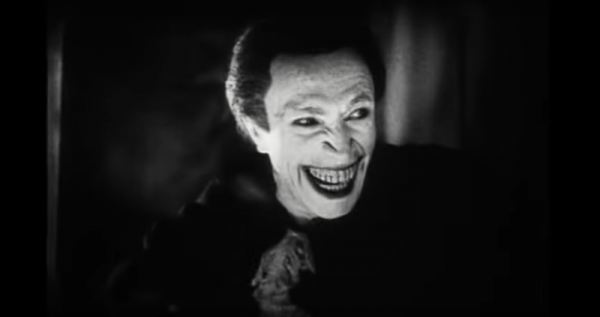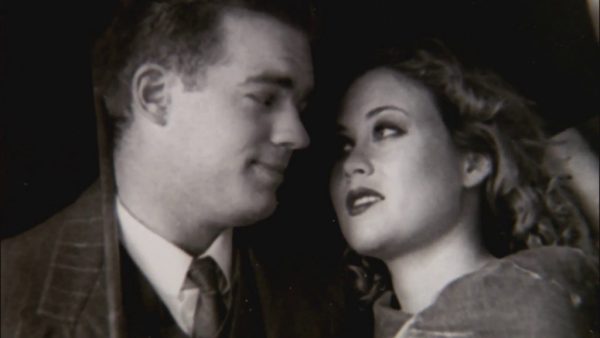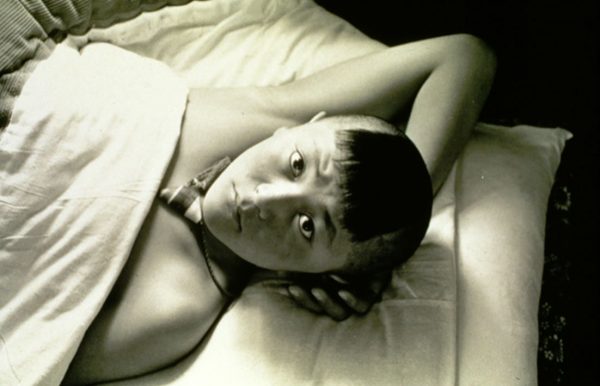Film Review: Want More Movies to Watch While Sheltering in Place? Stir-Crazy 5
By Gerald Peary
Five more feature films of great interest and their links, carefully chosen to get you through the travails of the coronavirus.

The great German actor Conrad Veidt in The Man Who Laughs.
The Man Who Laughs (1928) — Paul Leni’s film is among the greatest of silent works and among the most heart-wrenching. Who is not moved by the dreadful ordeal of Victor Hugo’s hero, pure and good Gwynplaine? As a boy, he was victimized by wicked child traffickers, who molded his face into a permanent jack-o’-lantern grin. Forever after, he sobs on the inside, smiles on the outside, through countless tragedies and his unrequited love of beautiful Dea. Gwynplaine is played by the great German actor Conrad Veidt, who was the somnambulist murderer in The Cabinet of Dr. Caligari and Rick’s Nazi nemesis in Casablanca. J.D. Salinger was surely inspired by Gwynplaine’s plight when concocting his Nine Stories entry, “The Laughing Man.” https://www.dailymotion.com/video/x22yaio

Switchblade Sisters (1975) — Quentin Tarantino, an ardent fan of its director, Jack Hill, brought this one back into circulation, a sloppy, earnest, enjoyable campy “B” amalgam of John Waters and a nonsinging, nondancing West Side Story. It’s the saga of the Dagger Debs, who hang out at a no-name hamburger joint and rescue blond Maggie from a horny lesbian cop. But Maggie’s travails are just begun. At the denouement is her blood-dripping soliloquy, Joan Crawford as Medea Dearest. Add in a roller-skate-rink massacre, an all-female Maoist guerilla cadre, and the appearance, as an overweight, pushed-around Dagger Deb, of Kitty Bruce, daughter of Lenny. I interviewed Jack Hill in 1996, when the film was revived. He said, “The reaction has been positive and enthusiastic. How many movies nowadays can audiences talk back to the screen?” $3.99 rental. https://www.youtube.com/watch?v=TjuJUcHmMzg

A scene from Forgotten Silver
Forgotten Silver (1995) — I much prefer the pre-Lord of the Rings Peter Jackson of Heavenly Creatures and this inspired mockumentary. Appearing on camera, Jackson immodestly claims to have single-handedly discovered the missing works of a New England silent director whose oeuvre rivals that of D.W. Griffith. We’re talking the kiwi auteur Colin McKenzie. Straight-faced interviews with stolid New Zealanders trace McKenzie’s extraordinary career, in which he apparently discovered sound and color long before their filmic time. There are testaments to McKenzie’s international status from film historian Leonard Maltin but also by a world-renowned liar: yes, Harvey Weinstein himself. Forgotten Silver climaxes Heart of Darkness lite. It’s Jackson’s Marlowe-like journey into the New Zealand deep to uncover the lost city constructed by McKenzie for a silent masterpiece, his bombastic attempt to one-up Griffith’s Intolerance. $3.99 rental. https://vimeo.com/ondemand/forgottensilver
Dexter Gordon: More Than You Know (1997) — In this documentary for Danish television, filmmaker Don McGlynn slides through Gordon’s half-century of tenor sax, from breaking in at age 17 with the Lionel Hampton Band to his late days (he died in 1990) residing and playing in Copenhagen. There’s wonderful Gordon music in the film, from straight-ahead bebop to warm, melodic tunes, but everything feels tragic in the life of this gentle, sorrowful man weighed down by bad breaks. Does anyone recall that, a good break, Gordon was nominated for an Oscar for his thinly autobiographical role in Bertrand Tavernier’s Round Midnight (1986), about a jazz musician staggering about Paris? A highlight here is Gordon’s audition for the film, in which he told a World War II story about punching out his captain and being dishonorably discharged from the military. “In the army, we were in a Negro unit with pink officers,” he explained. https://www.youtube.com/watch?v=n-ScJf6hYS4

A scene from Beshkempir-The Adopted Son.
Beshkempir-The Adopted Son (1999) — Never seen a film from the former Soviet republic of Kyrgyzstan? The Soros Foundation was behind the funding of this charming feature by Aktan Abydykalkov, a filmmaker with raw talent and a distinctive poetic style. It’s about the erotic awakening of a boy, about 12, who is crazy about a girl, tall, gawky, in a gingham dress. He places her on his prized bicycle. The movie is told visually from Beshkempir’s blessed birth among wizened old ladies to the public funeral and wailing at the death of his grandmother. At unexpected moments, Abydykalkov glides his black-and-white film into Kodak color and into a kind of magical surrealism. https://www.youtube.com/watch?v=aLRTEUqa-q4
Gerald Peary is a Professor Emeritus at Suffolk University, Boston, curator of the Boston University Cinematheque, and the general editor of the “Conversations with Filmmakers” series from the University Press of Mississippi. A critic for the late Boston Phoenix, he is the author of nine books on cinema, writer-director of the documentaries For the Love of Movies: the Story of American Film Criticism and Archie’s Betty, and a featured actor in the 2013 independent narrative Computer Chess. His new feature documentary, The Rabbi Goes West, co-directed by Amy Geller, is playing at film festivals around the world.
Tagged: Beshkempir-The Adopted Son<, Dexter Gordon: More Than You Know, Forgotten Silver, Switchblade Sisters

